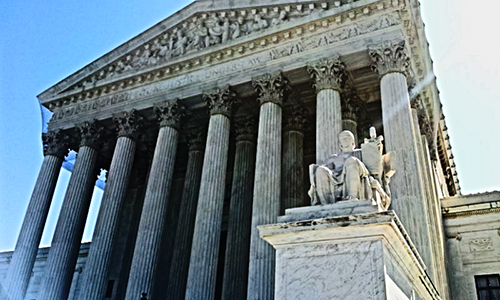The Supreme Court recently issued a decision in an immigration-related case Kerry, Secretary of State, et al. v. Din. The decision reaffirms that although people have the right to marry anyone they like, if the spouse is a foreigner, he or she has no intrinsic right to enter the United States when excludable under any of the grounds laid out by law.
To people like myself, it is one of the rare victories these days in an increasingly beleaguered national immigration system under peril from open borders advocates who persistently push the boundaries of sovereignty and common sense.

Here are the facts in brief: Fauzia Din, a lawful resident alien of the United States originally from Afghanistan (who later naturalized during the course of events this case touches upon), married an Afghan man, Kanishka Berakh, whom she petitioned the government to permit to immigrate to the United States as her immediate relative spouse. The petition was approved by U.S. Citizenship and Immigration Services (USCIS), a subordinate agency in the Department of Homeland Security that adjudicates all immigration-related benefits within the United States. It was then sent to an American embassy where the man was interviewed by a consular officer in regard to his application for an immigrant visa. This led to his denial of the visa based on terrorism grounds because Berakh had worked in one of the ministries of the Taliban government when it ruled Afghanistan.
Under existing interpretations of American law, Berakh could not file a lawsuit to overturn the decision because of the doctrine of non-reviewability — a doctrine that, logically enough, says that aliens outside of the country have no right to avail themselves of U.S. courts to overturn visa decisions as a way of trying to force their way in. The couple's attorney(s), apparently astute enough to realize trying to go that route would be a dead end, decided on a legal end-around and she (Din) filed suit alleging that the denial of his immigrant visa, and therefore of his ability to enter the United States, infringed on her constitutionally protected marital rights.
The judge of first instance in federal district court disagreed with that novel interpretation of constitutionally protected rights (which would make a mockery of virtually all the legitimate grounds of exclusion that protect society at large, such as the one forbidding entry of terrorists and their supporters). Din appealed and the federal Ninth Circuit Court of Appeals (9-CCA) — the most liberal in the country — reversed the trial judge. Shockingly, the government held firm on this one instead of collapsing in the face of alien advocacy, as so often happens, and decided to seek a hearing in the Supreme Court to reverse the appellate court, which is what ultimately happened.
Despite the salutary outcome, there are several disturbing things about this case that merit mentioning:
- First, of course, is that the 9-CCA ruled as it did. One sometimes wonders whether they ought to be impeached, en banc. Perhaps they could take up residence as appellate court judges somewhere else more appropriate to their extreme views? Like Venezuela.
- Next, is that four of the nine Supreme Court justices also held that Din's rights had been infringed because of her husband's visa denial, and that she was somehow entitled to additional due process review because of it. Imagine the loophole that would have been caused but for one slim vote. Terrorists, narcotraffickers, and sundry other villains would be lining up to join the marriage fraud queue so that their spouses could avail themselves of their "constitutional right" to live in the United States with them.
- Then there is the curious case of Din herself. She came to the United States as a refugee from Afghanistan in 2000 when the Taliban was in the full glory of its power, sheltering the likes of Osama bin Laden and conducting public maimings, stonings, and executions under Sharia law at the main soccer stadium in Kabul. But where did she find her husband? In Afghanistan, where she traveled in 2006. And whom did he work for? The Taliban, from whom she presumably sought refuge. Did none of this seem curious or anomalous to the folks at USCIS — the ones who had granted her the refugee status in the first place, who were adjudicating her petition for her spouse, and who could have, who should have, taken a second look at whether her refugee application was fraudulent instead of proceeding to naturalize her? Nah, apparently not.
Kind of disturbing to think that USCIS and courts like the Ninth Circuit are the thin line protecting us from terrorists seeking benefits to live in the United States.
